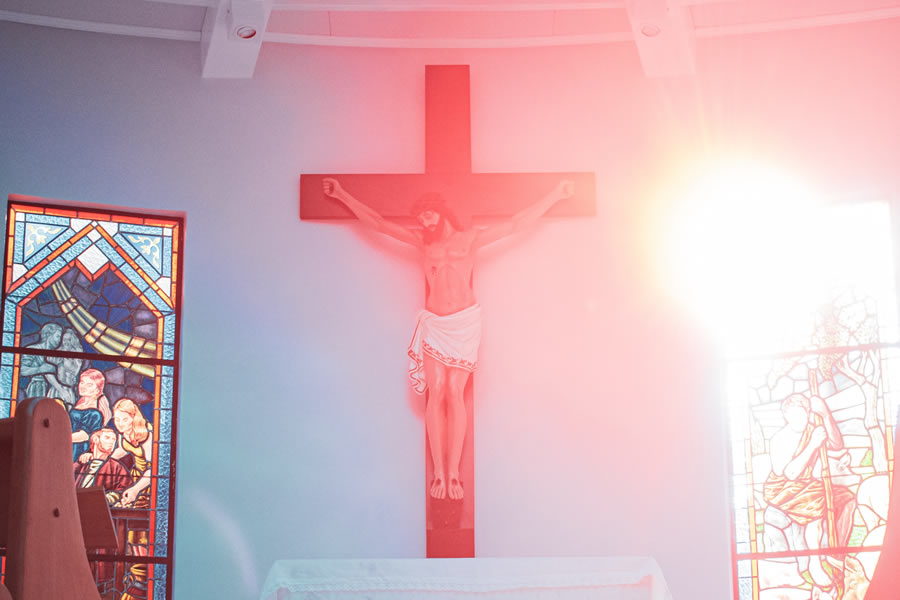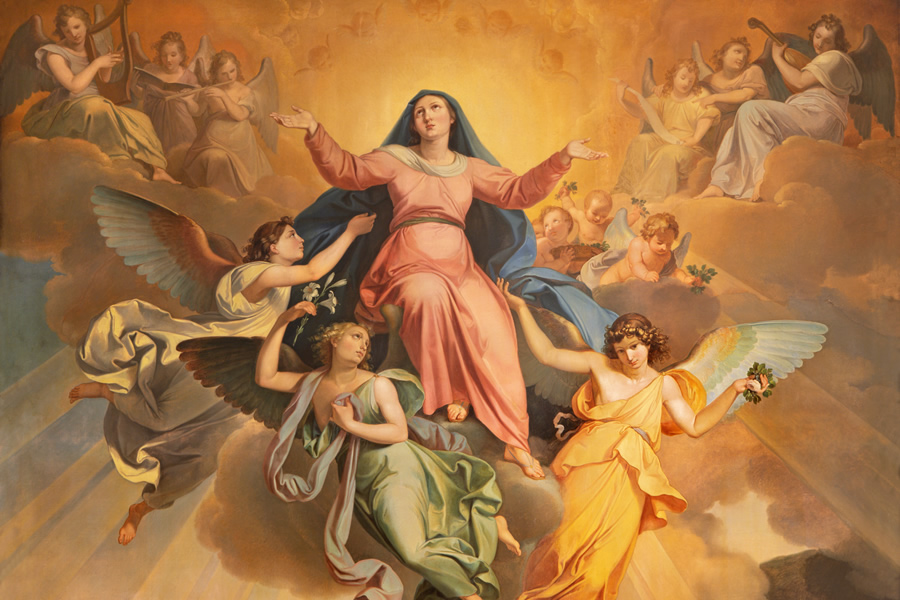
The Freedom of God
09-26-2021Weekly Reflection© J. S. Paluch CompanyToday's readings remind us that God is free: God acts as God wills regardless of what human beings might expect. In the reading from Numbers, God's spirit enters two men, Eldad and Medad, even though they had not been with the others who had received the spirit of God. And in Mark’s Gospel, Jesus endorses an unknown exorcist, who did God's work in the name of Jesus but was not officially sanctioned by the disciples. That God's spirit is shared widely does not threaten Moses or Jesus. They celebrate the notion that God’s spirit blows where it wills.
READ MORE
Two Paths
09-19-2021Weekly Reflection© J. S. Paluch CompanyToday’s first two readings present a striking contrast between two pathways in life. InWisdom and the letter from James we are told of the path of the wicked, which leads tooppression and violence. We also hear of the path of the faithful, which leads to peaceand human flourishing. Then our Gospel reading from Mark takes our reflection farther.The choice is shown to be not so simple or obvious. The path of faithfulness means following Jesus’ lead, to expand our circle of care toward everyone, especially the most vulnerable. This path also includes opening ourselves to suffering and trials, as we face resistance from within and from outside us. The two paths essentially diverge over whetherwe refuse or accept God’s love. Each day we face such choices as God invites us into thedivine circle of care and enlists us to extend our own circle to those around us.
READ MORE
Suffering, Hope and Love
09-12-2021Weekly Reflection© J. S. Paluch CompanyOur readings from Isaiah and from the Gospel of Mark confront us with the fact that the invitation to faith leads us into suffering. In Isaiah, the prophet accepts pain and shaming from others, as he trusts in God. In Mark, Jesus is blunt about this: “Whoever wishes to come after me must deny himself, take up his cross, and follow me.” When we embrace faith, we are confronted with our own fears about suffering and about losing comfort, status, and control over our lives.
READ MORE
God Lifts Us Up
09-05-2021Weekly Reflection© J. S. Paluch CompanyOur readings this Sunday describe God’s work of liberation for those who are vulnerable. Isaiah portrays the coming of God in terms of the healing of the blind, the deaf, and the lame. James notes that God chooses the poor to be rich in faith. In Mark’s Gospel, Jesus heals a deaf person who has a speech impediment. The readings remind us of the acute struggles of the disabled, the excluded, and the poor. In the last year and a half, the pandemic has reminded us that we are all vulnerable, that illness and death are near us always. Today we hear that God’s presence is revealed when God lifts us up, and when we join God to lift each other up. Our care for others, especially those in greatest need, can be our grateful response to God’s healing of us in our own vulnerability.
READ MORE
God's Laws
08-29-2021Weekly Reflection© J. S. Paluch CompanyToday’s readings provide some interesting parallels and contrasts. The first reading is an account of Moses who, having delivered the Law to the Israelites, admonishes them to “observe them [its statutes] carefully.” The author of the Letter of James likewise instructs fellow Christians to “welcome the word” they have received, that they may become “doers of the words and not hearers only.” The psalmist praises “whoever walks blamelessly and does justice” by listing a few examples of what is required for that—descriptions that apply equally to both Jewish and Christian traditions. On the other hand, when the scribes and Pharisees point out that the disciples have not properly washed their hands before eating (which is, as Mark explains, the usual Jewish practice) Jesus scolds them sharply for being too focused on human rules—even ritual ones —instead of God’s laws.
READ MORE
Whom should we follow?
08-22-2021Weekly Reflection© J. S. Paluch CompanyToday’s Gospel is the conclusion of the Bread of Life discourse in John. After Jesus’ continued insistence that he is the Bread of Life come down from heaven, and that his words are “Spirit and life,” most of his disciples drift away. The Twelve, however, affirm their faith in Jesus, whom Simon Peter professes to “have the words of eternal life.” In the first reading, Joshua and the Israelites are preparing to enter the Promised Land, and Joshua asks the people to decide which god they will follow, the Lorp their God, or the gods of neighboring peoples. The Responsorial Psalm features Psalm 34, the “taste and see” psalm, that reflects the kinds of struggles the Israelites faced during their sojourn in the wilderness. In the second reading, Paul gives counsel for maintaining domestic peace and happiness.
READ MORE
Pointing the Way
08-15-2021Weekly Reflection© J. S. Paluch CompanyToday we celebrate the Assumption of the Blessed Virgin Mary. The readingsgive us much to ponder as we reflect on Mary, her special place prepared byGod for eternity, and all that resulted from her “yes” to the angel’s messagethat she was to bear the Christ, the anointed one of God. Mary is “blessedamong women,” the vessel for the life and salvation of Christ for all generations. Mary always points us to her son, Jesus. Through her witness, weare inspired to proclaim the greatness of the Lord with our lives. In her Assumption, we are assured that Mary is in the presence of God, pointing theway to all who live as God’s good and holy people in this life while we awaitultimate fulfillment in the next.
READ MORE
The Bread of Life
08-08-2021Weekly Reflection© J. S. Paluch CompanyChapter 6 in John’s Gospel is often referred to as the Bread of Life discourse, perhaps because this is where Jesus makes his strongest claims for being the bread that has come down from heaven, bringing eternal life for those who believe in him. This is one source of our belief in the Real Presence of Christ in the Eucharist. In the first reading, the prophet Elijah has come to the brink of despair, but an angel comes with food and tells him to eat, “else the journey will be too long for you.” The Responsorial Psalm is from Psalm 34; from very early on, the Church has applied the line, “Taste and see how good the Lord is” to the Eucharist. The second reading describes an ideal Christian community characterized by mutual love and service, which is the greatest fruit of its eucharistic celebrations.
READ MORE
God Provides
08-01-2021Weekly Reflection© J. S. Paluch CompanyToday’s gospel is a sequel to last weeks account of Jesus feeding a large crowd with five barley loaves and a few fish. Here Jesus is challenging a crowd to see in the bread they have eaten a sign of gods generosity and providing for all the blessings in their lives, as well as the blessing of life itself. The first reading from Exodus recounts how escaped Hebrew slaves were fed in the wilderness, first with quail, then with Nana. The psalm is a later reflection on the mana as the bread from heaven and a blessing from God. The selection from the letter to the Ephesians sketch is the image of putting away “old self“ and putting on the new, emphasizing that a persons life in Christ needs to differ from their previous life, just as the life of a free person differs from that of a slave.
READ MORE
God Feeds and Cares for Us
07-25-2021Weekly Reflection© J. S. Paluch CompanyToday’s message could be summed up in psalm 145, “The hand of the Lord feeds us, he answers all our needs.” Each reading shows how carefully God feeds and cares for us, in an up-close and personal fashion. Elisha fed the crowd from twenty barley loaves. Jesus blessed a few loaves, and thousands were fed. Perhaps this seems far-fetched, but we read stories in the news about chefs taking the leftovers from fancy restaurants and feeding many people in a soup kitchen. As a schoolgirl, one of my favorite stories was “Stone Soup”, the tale of a couple of war-weary soldiers convincing the people of a frightened and starving little country village to bring out their meager supplies and share them to make a marvelous soup to feed the town. The second reading asks us to “Consider well our call.” How do we respond to those in need around us?
READ MORE
Compassion
07-18-2021Weekly Reflection© J. S. Paluch CompanyIf we were to use one word to describe the Scriptures for today, it would be "compassion." In Jeremiah, God rails against those who have scattered the sheep, and vows to "gather the remnant" personally. We also hear the prophecy about the coming Messiah. In Ephesians, Christ is breaking down the walls of division between peoples and drawing them to be reconciled with God in peace. In Mark, Jesus calls the tire disciples away to rest and have some "me time," but even the crowds persisted. Jesus saw their spiritual hunger and neediness and was "moved with pity." All three situations involve looking beyond one’s own agenda to see the needs of others and respond. God models how to empathize with others. May we continue to learn to be kinder gentler and more caring for each other.
READ MORE
Called to be Extraordinary
07-11-2021Weekly Reflection© J. S. Paluch CompanyMother Theresa challenge us to do ordinary things with extraordinary love. Basketball coach Jim Valvano said, “every single day and every walk of life ordinary people to extraordinary things.“ Sometimes we see extraordinary vocations, such as the child prodigy musician. But usually those whom God chooses to call our reluctant participants who either run from the call or ignore it Amos tells Amaziah “I was a shepherd and a dresser of sycamores.“ He looked after sheep and punched holes and fruit for a living! Now he was being called to prophecy. In Mark‘s gospel of the apostles are sent out two buy two to begin their ministry. Paul takes it further, telling the Ephesians, “In him we were also chosen, destined in accord with the purpose of the one who accomplishes all things.” This call goes out to all of us! How are you being called to be extraordinary this day?
READ MORE
Paying the Price
07-04-2021Weekly Reflection© J. S. Paluch CompanyIn the Sunday Lectionary, the first reading is usually chosen from anywhere in the Hebrew Bible to tie together with the Gospel. Currently, the second reading is from Saint Paul’s second letter to the Corinthians. Often the second reading is not so closely related to the day’s Gospel selection, because those books are read in a more continuous fashion from week to week. But today, all three of the scripture readings go together very well.
READ MORE